Comparative Analysis: Business Negotiation in UK and China
VerifiedAdded on 2020/03/23
|84
|24707
|38
Report
AI Summary
This report provides a comprehensive cross-cultural comparison of international business negotiation styles, specifically focusing on the differences between China and the UK. The study examines the influence of culture on negotiation approaches within the financial services sector, exploring key cultural dimensions like those proposed by Hofstede and Hall. The research employs a descriptive research design, utilizing secondary data and meta-analysis to identify similarities and differences in negotiation processes. The report delves into the impact of cultural nuances on communication, strategies, and outcomes in business negotiations. The findings highlight the significance of understanding cultural differences for effective international business practices, offering valuable insights for managers and businesses operating in a globalized environment. It concludes with recommendations for improving negotiation strategies and suggests areas for future research in this dynamic field. The report covers topics such as the impact of globalization, the importance of cultural understanding, negotiation strategies, and the financial services sectors in both countries. It also examines the research methodology, literature review, data analysis, findings, and conclusions, providing a well-rounded overview of the topic.
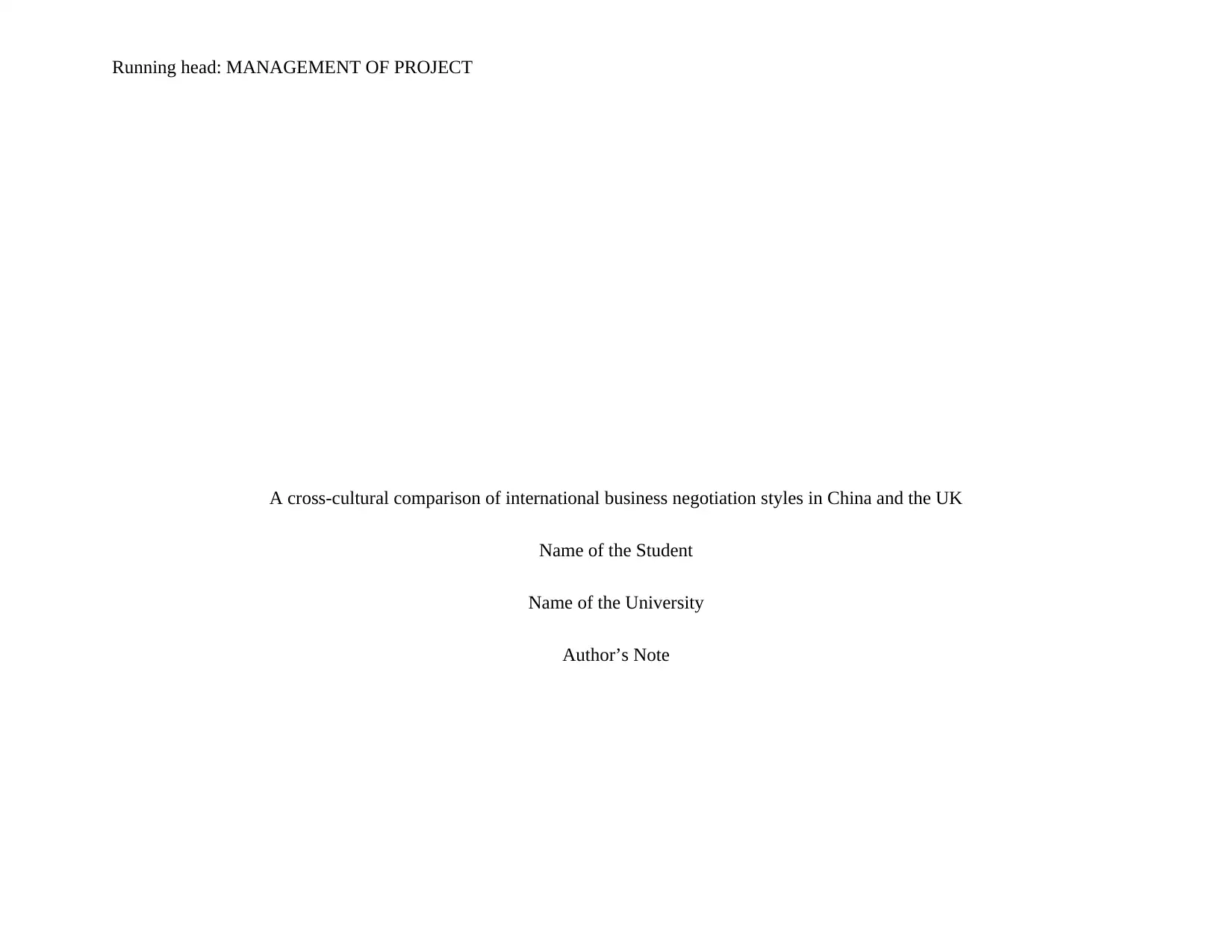
Running head: MANAGEMENT OF PROJECT
A cross-cultural comparison of international business negotiation styles in China and the UK
Name of the Student
Name of the University
Author’s Note
A cross-cultural comparison of international business negotiation styles in China and the UK
Name of the Student
Name of the University
Author’s Note
Paraphrase This Document
Need a fresh take? Get an instant paraphrase of this document with our AI Paraphraser
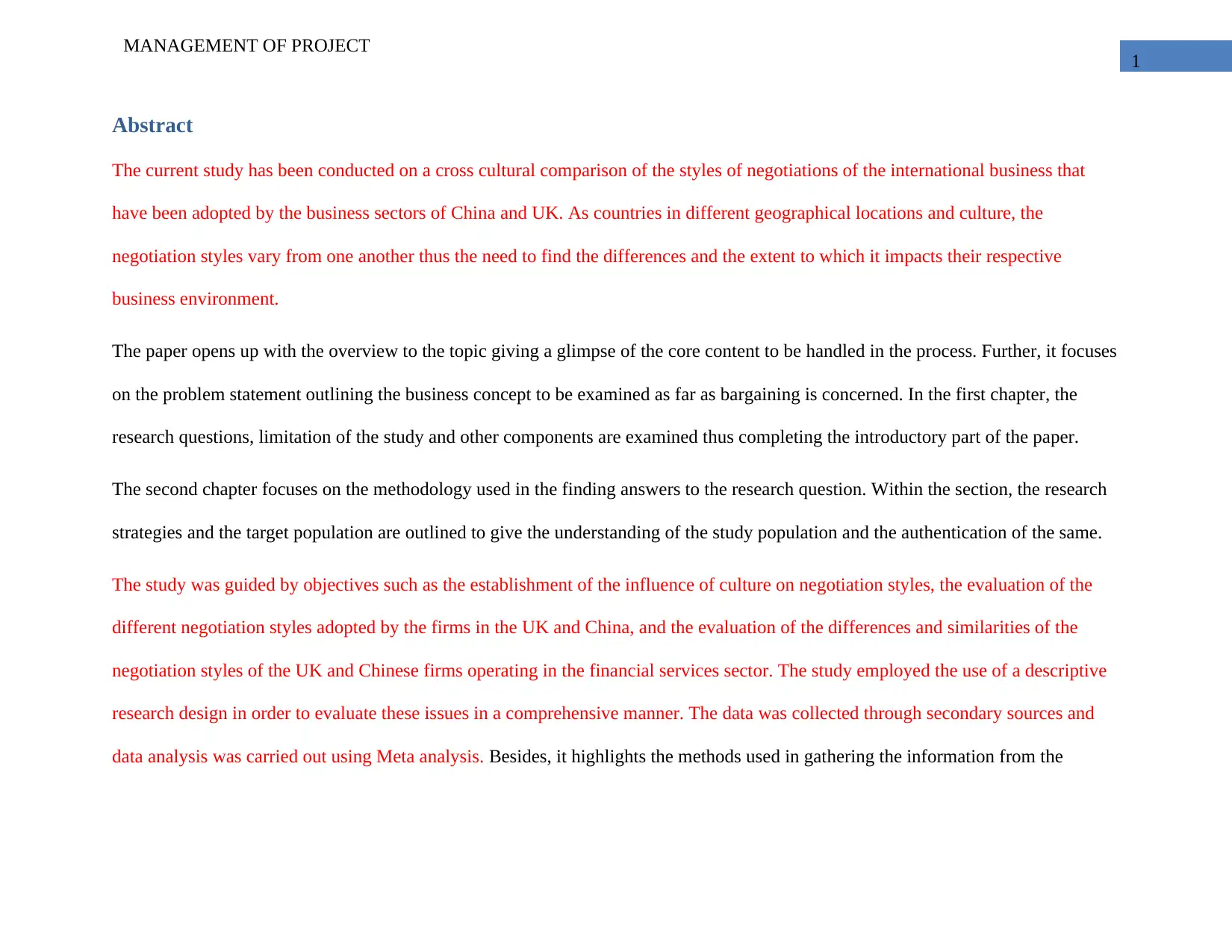
1
MANAGEMENT OF PROJECT
Abstract
The current study has been conducted on a cross cultural comparison of the styles of negotiations of the international business that
have been adopted by the business sectors of China and UK. As countries in different geographical locations and culture, the
negotiation styles vary from one another thus the need to find the differences and the extent to which it impacts their respective
business environment.
The paper opens up with the overview to the topic giving a glimpse of the core content to be handled in the process. Further, it focuses
on the problem statement outlining the business concept to be examined as far as bargaining is concerned. In the first chapter, the
research questions, limitation of the study and other components are examined thus completing the introductory part of the paper.
The second chapter focuses on the methodology used in the finding answers to the research question. Within the section, the research
strategies and the target population are outlined to give the understanding of the study population and the authentication of the same.
The study was guided by objectives such as the establishment of the influence of culture on negotiation styles, the evaluation of the
different negotiation styles adopted by the firms in the UK and China, and the evaluation of the differences and similarities of the
negotiation styles of the UK and Chinese firms operating in the financial services sector. The study employed the use of a descriptive
research design in order to evaluate these issues in a comprehensive manner. The data was collected through secondary sources and
data analysis was carried out using Meta analysis. Besides, it highlights the methods used in gathering the information from the
MANAGEMENT OF PROJECT
Abstract
The current study has been conducted on a cross cultural comparison of the styles of negotiations of the international business that
have been adopted by the business sectors of China and UK. As countries in different geographical locations and culture, the
negotiation styles vary from one another thus the need to find the differences and the extent to which it impacts their respective
business environment.
The paper opens up with the overview to the topic giving a glimpse of the core content to be handled in the process. Further, it focuses
on the problem statement outlining the business concept to be examined as far as bargaining is concerned. In the first chapter, the
research questions, limitation of the study and other components are examined thus completing the introductory part of the paper.
The second chapter focuses on the methodology used in the finding answers to the research question. Within the section, the research
strategies and the target population are outlined to give the understanding of the study population and the authentication of the same.
The study was guided by objectives such as the establishment of the influence of culture on negotiation styles, the evaluation of the
different negotiation styles adopted by the firms in the UK and China, and the evaluation of the differences and similarities of the
negotiation styles of the UK and Chinese firms operating in the financial services sector. The study employed the use of a descriptive
research design in order to evaluate these issues in a comprehensive manner. The data was collected through secondary sources and
data analysis was carried out using Meta analysis. Besides, it highlights the methods used in gathering the information from the
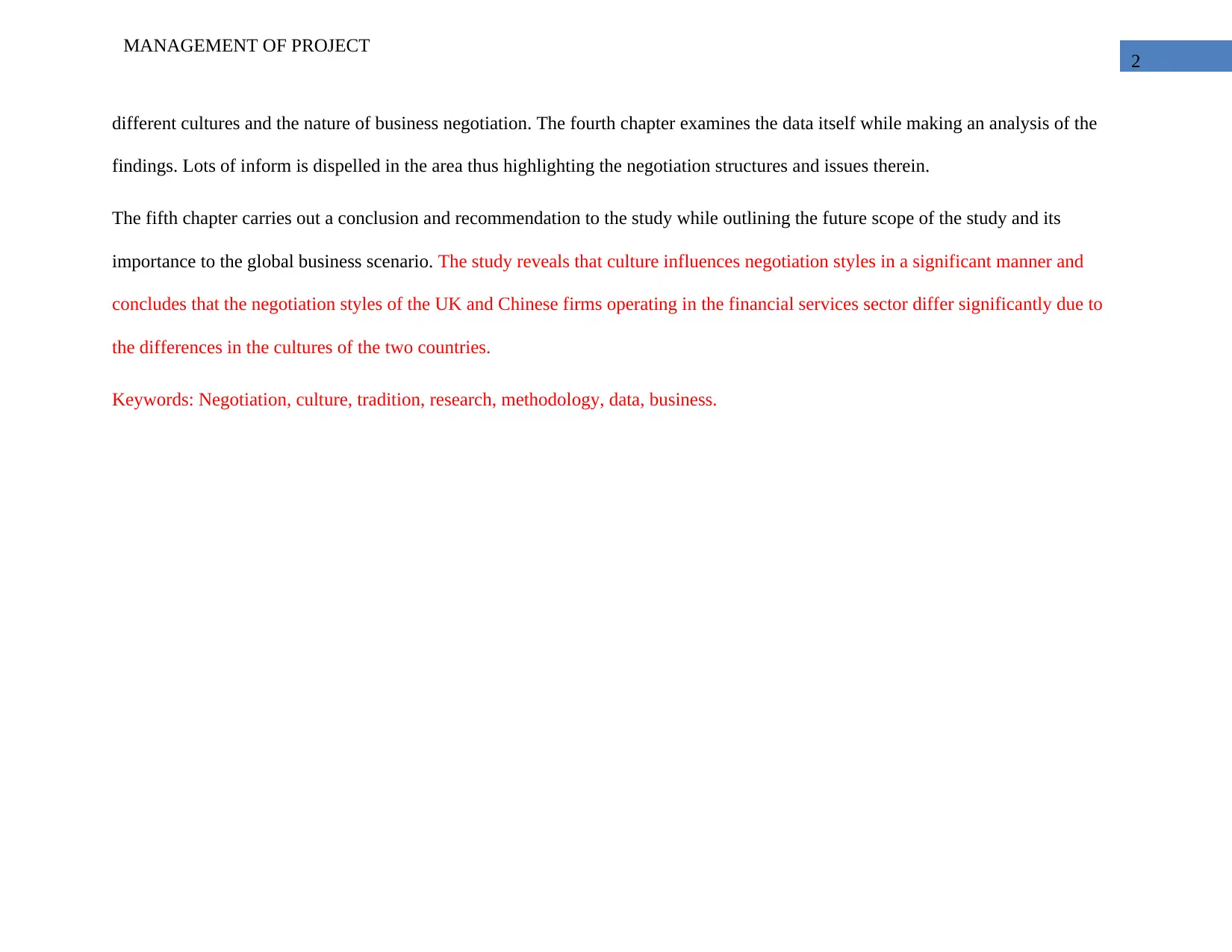
2
MANAGEMENT OF PROJECT
different cultures and the nature of business negotiation. The fourth chapter examines the data itself while making an analysis of the
findings. Lots of inform is dispelled in the area thus highlighting the negotiation structures and issues therein.
The fifth chapter carries out a conclusion and recommendation to the study while outlining the future scope of the study and its
importance to the global business scenario. The study reveals that culture influences negotiation styles in a significant manner and
concludes that the negotiation styles of the UK and Chinese firms operating in the financial services sector differ significantly due to
the differences in the cultures of the two countries.
Keywords: Negotiation, culture, tradition, research, methodology, data, business.
MANAGEMENT OF PROJECT
different cultures and the nature of business negotiation. The fourth chapter examines the data itself while making an analysis of the
findings. Lots of inform is dispelled in the area thus highlighting the negotiation structures and issues therein.
The fifth chapter carries out a conclusion and recommendation to the study while outlining the future scope of the study and its
importance to the global business scenario. The study reveals that culture influences negotiation styles in a significant manner and
concludes that the negotiation styles of the UK and Chinese firms operating in the financial services sector differ significantly due to
the differences in the cultures of the two countries.
Keywords: Negotiation, culture, tradition, research, methodology, data, business.
⊘ This is a preview!⊘
Do you want full access?
Subscribe today to unlock all pages.

Trusted by 1+ million students worldwide
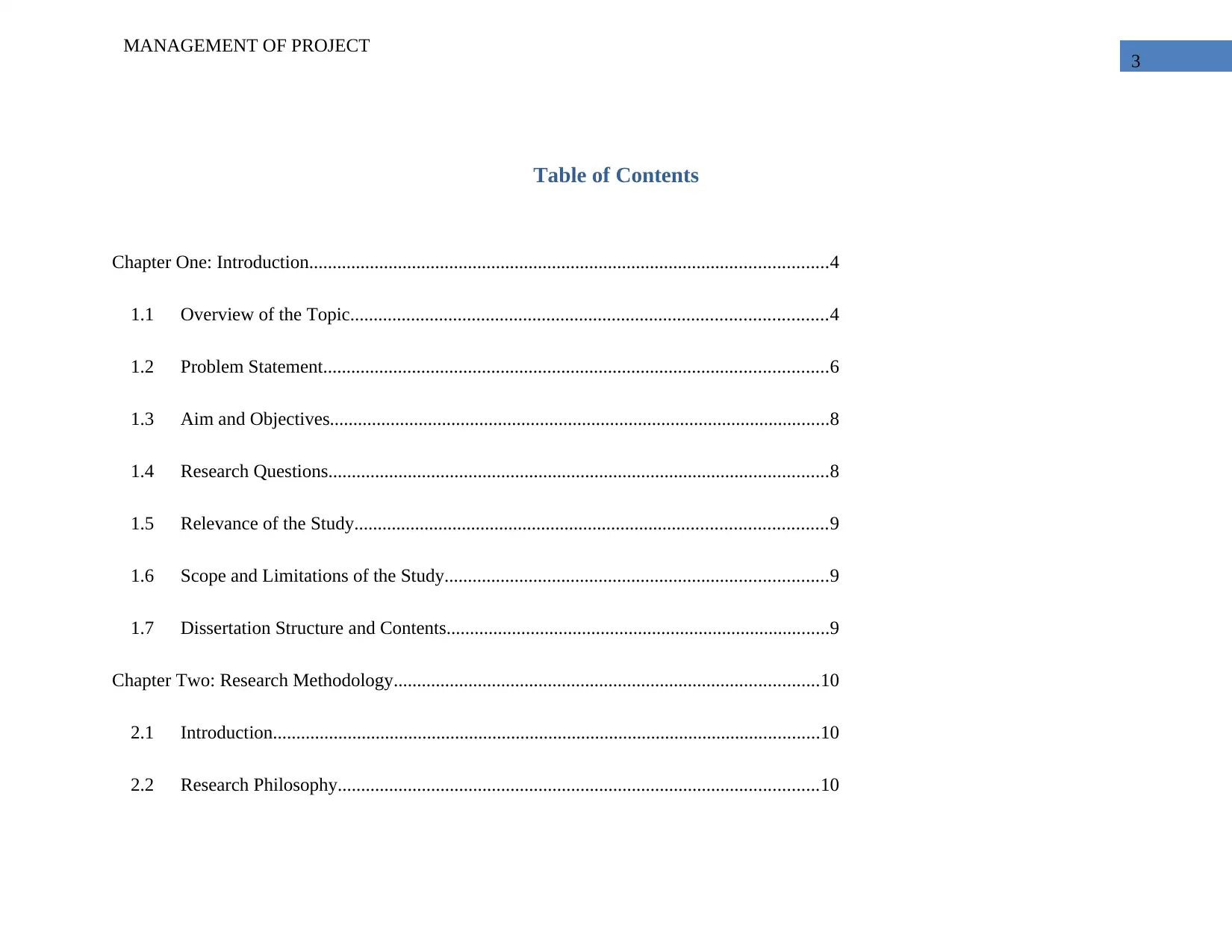
3
MANAGEMENT OF PROJECT
Table of Contents
Chapter One: Introduction...............................................................................................................4
1.1 Overview of the Topic......................................................................................................4
1.2 Problem Statement............................................................................................................6
1.3 Aim and Objectives...........................................................................................................8
1.4 Research Questions...........................................................................................................8
1.5 Relevance of the Study.....................................................................................................9
1.6 Scope and Limitations of the Study..................................................................................9
1.7 Dissertation Structure and Contents..................................................................................9
Chapter Two: Research Methodology...........................................................................................10
2.1 Introduction.....................................................................................................................10
2.2 Research Philosophy.......................................................................................................10
MANAGEMENT OF PROJECT
Table of Contents
Chapter One: Introduction...............................................................................................................4
1.1 Overview of the Topic......................................................................................................4
1.2 Problem Statement............................................................................................................6
1.3 Aim and Objectives...........................................................................................................8
1.4 Research Questions...........................................................................................................8
1.5 Relevance of the Study.....................................................................................................9
1.6 Scope and Limitations of the Study..................................................................................9
1.7 Dissertation Structure and Contents..................................................................................9
Chapter Two: Research Methodology...........................................................................................10
2.1 Introduction.....................................................................................................................10
2.2 Research Philosophy.......................................................................................................10
Paraphrase This Document
Need a fresh take? Get an instant paraphrase of this document with our AI Paraphraser
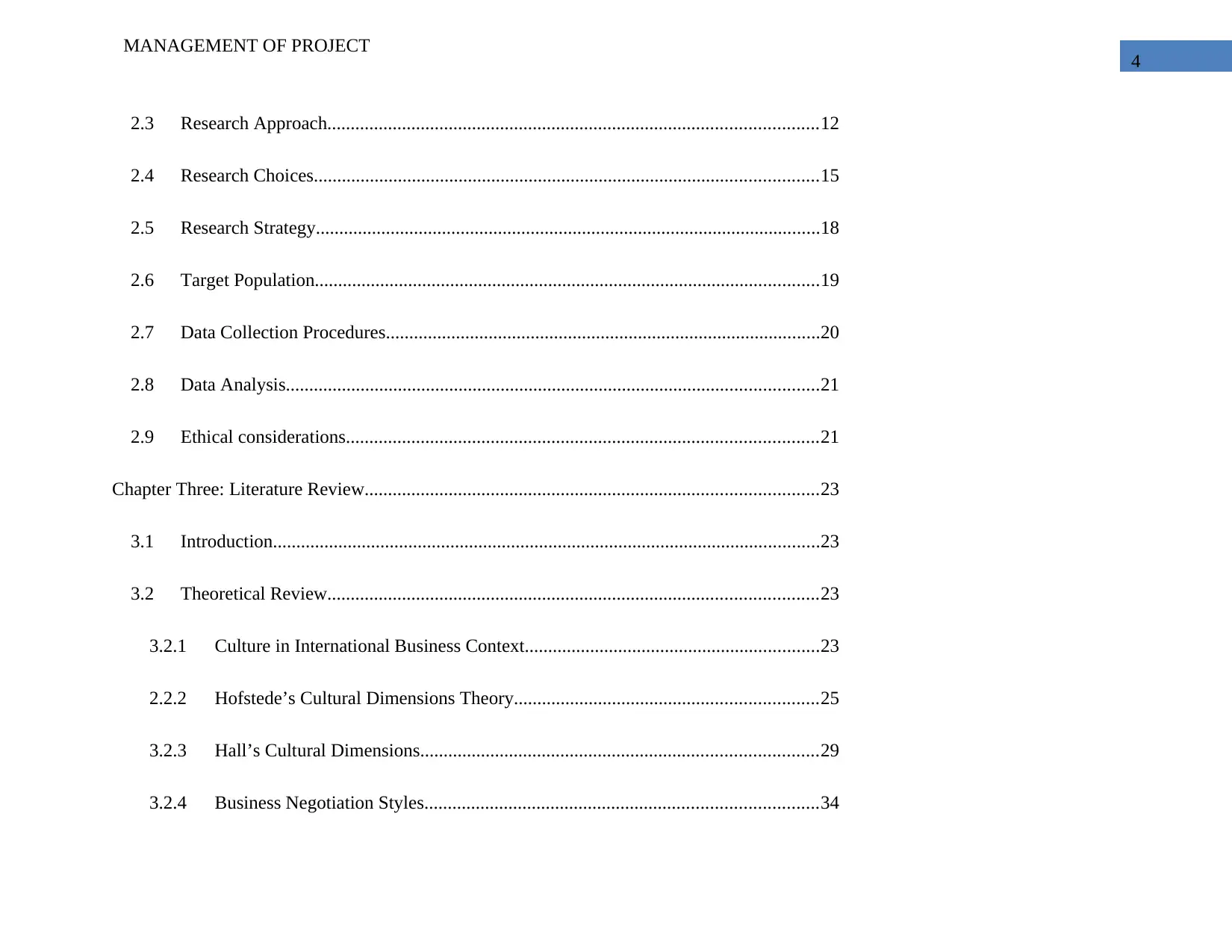
4
MANAGEMENT OF PROJECT
2.3 Research Approach.........................................................................................................12
2.4 Research Choices............................................................................................................15
2.5 Research Strategy............................................................................................................18
2.6 Target Population............................................................................................................19
2.7 Data Collection Procedures.............................................................................................20
2.8 Data Analysis..................................................................................................................21
2.9 Ethical considerations.....................................................................................................21
Chapter Three: Literature Review.................................................................................................23
3.1 Introduction.....................................................................................................................23
3.2 Theoretical Review.........................................................................................................23
3.2.1 Culture in International Business Context...............................................................23
2.2.2 Hofstede’s Cultural Dimensions Theory.................................................................25
3.2.3 Hall’s Cultural Dimensions.....................................................................................29
3.2.4 Business Negotiation Styles....................................................................................34
MANAGEMENT OF PROJECT
2.3 Research Approach.........................................................................................................12
2.4 Research Choices............................................................................................................15
2.5 Research Strategy............................................................................................................18
2.6 Target Population............................................................................................................19
2.7 Data Collection Procedures.............................................................................................20
2.8 Data Analysis..................................................................................................................21
2.9 Ethical considerations.....................................................................................................21
Chapter Three: Literature Review.................................................................................................23
3.1 Introduction.....................................................................................................................23
3.2 Theoretical Review.........................................................................................................23
3.2.1 Culture in International Business Context...............................................................23
2.2.2 Hofstede’s Cultural Dimensions Theory.................................................................25
3.2.3 Hall’s Cultural Dimensions.....................................................................................29
3.2.4 Business Negotiation Styles....................................................................................34
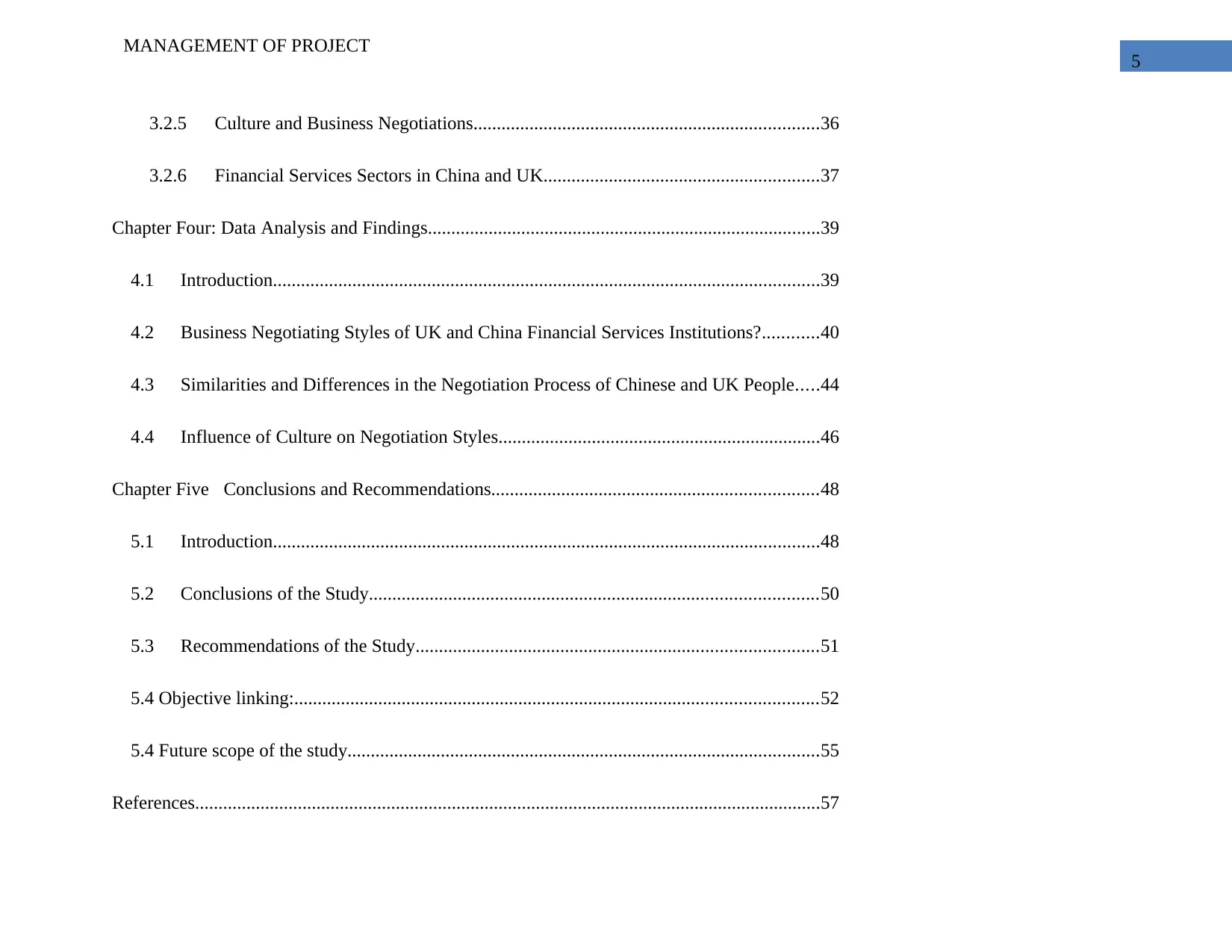
5
MANAGEMENT OF PROJECT
3.2.5 Culture and Business Negotiations..........................................................................36
3.2.6 Financial Services Sectors in China and UK...........................................................37
Chapter Four: Data Analysis and Findings....................................................................................39
4.1 Introduction.....................................................................................................................39
4.2 Business Negotiating Styles of UK and China Financial Services Institutions?............40
4.3 Similarities and Differences in the Negotiation Process of Chinese and UK People.....44
4.4 Influence of Culture on Negotiation Styles.....................................................................46
Chapter Five:Conclusions and Recommendations......................................................................48
5.1 Introduction.....................................................................................................................48
5.2 Conclusions of the Study................................................................................................50
5.3 Recommendations of the Study......................................................................................51
5.4 Objective linking:................................................................................................................52
5.4 Future scope of the study.....................................................................................................55
References......................................................................................................................................57
MANAGEMENT OF PROJECT
3.2.5 Culture and Business Negotiations..........................................................................36
3.2.6 Financial Services Sectors in China and UK...........................................................37
Chapter Four: Data Analysis and Findings....................................................................................39
4.1 Introduction.....................................................................................................................39
4.2 Business Negotiating Styles of UK and China Financial Services Institutions?............40
4.3 Similarities and Differences in the Negotiation Process of Chinese and UK People.....44
4.4 Influence of Culture on Negotiation Styles.....................................................................46
Chapter Five:Conclusions and Recommendations......................................................................48
5.1 Introduction.....................................................................................................................48
5.2 Conclusions of the Study................................................................................................50
5.3 Recommendations of the Study......................................................................................51
5.4 Objective linking:................................................................................................................52
5.4 Future scope of the study.....................................................................................................55
References......................................................................................................................................57
⊘ This is a preview!⊘
Do you want full access?
Subscribe today to unlock all pages.

Trusted by 1+ million students worldwide
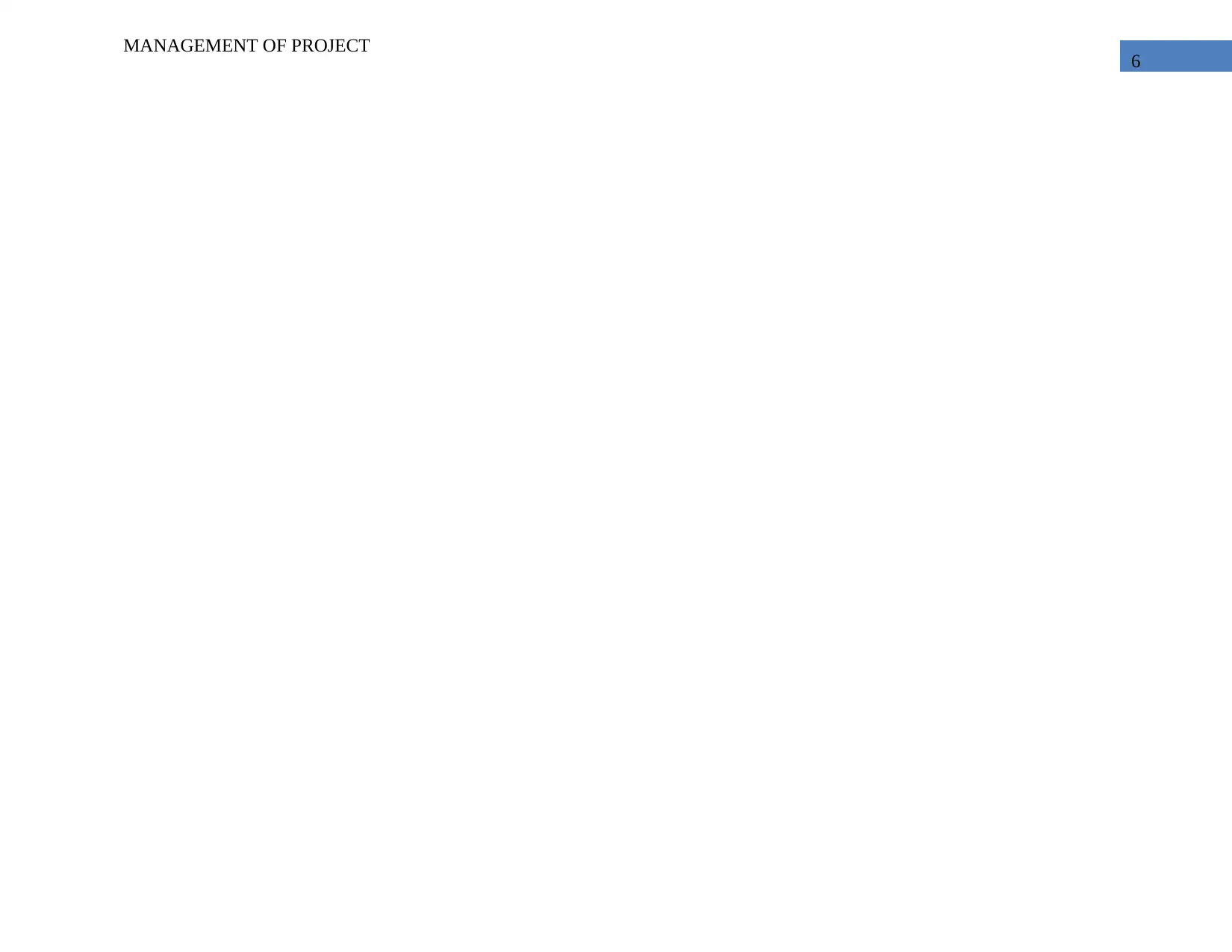
6
MANAGEMENT OF PROJECT
MANAGEMENT OF PROJECT
Paraphrase This Document
Need a fresh take? Get an instant paraphrase of this document with our AI Paraphraser
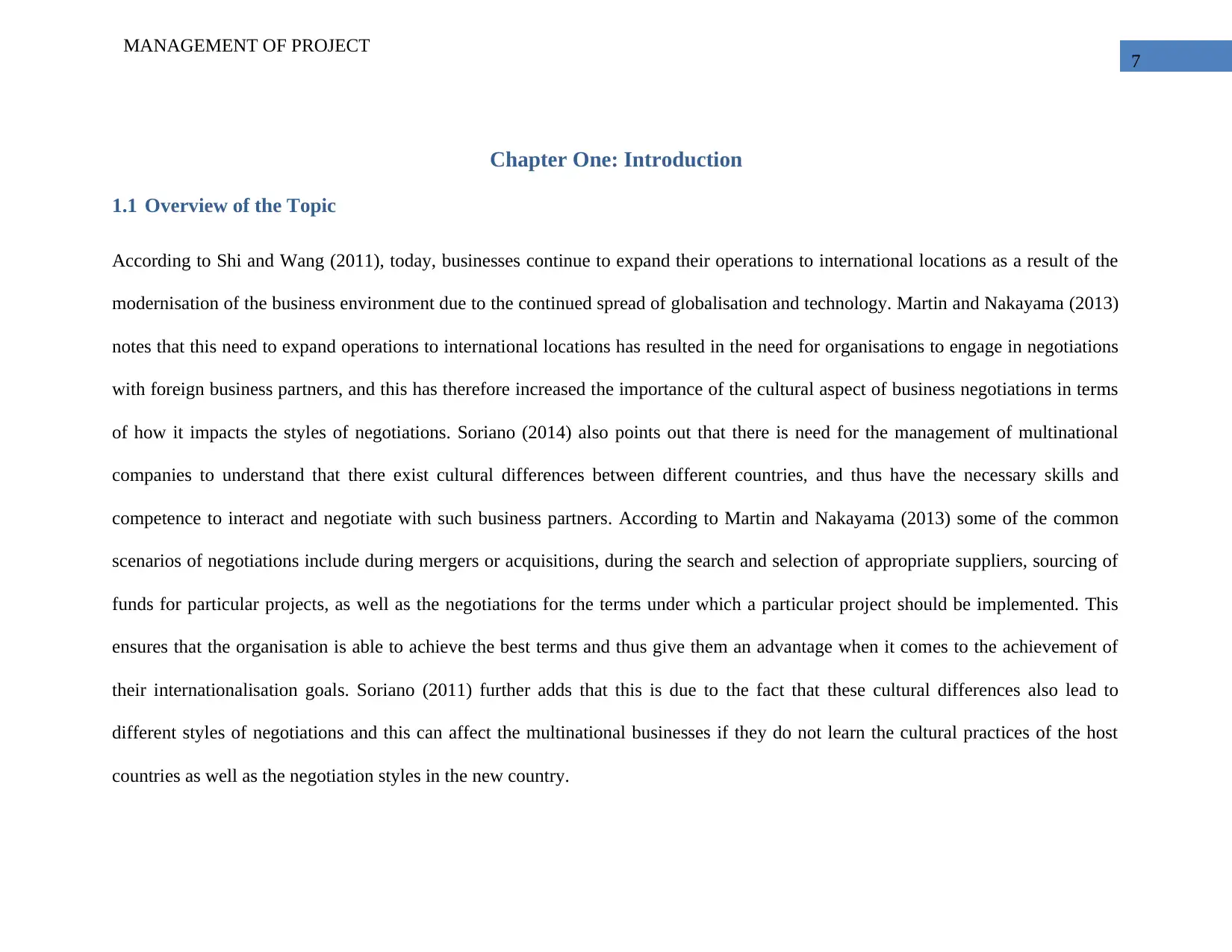
7
MANAGEMENT OF PROJECT
Chapter One: Introduction
1.1 Overview of the Topic
According to Shi and Wang (2011), today, businesses continue to expand their operations to international locations as a result of the
modernisation of the business environment due to the continued spread of globalisation and technology. Martin and Nakayama (2013)
notes that this need to expand operations to international locations has resulted in the need for organisations to engage in negotiations
with foreign business partners, and this has therefore increased the importance of the cultural aspect of business negotiations in terms
of how it impacts the styles of negotiations. Soriano (2014) also points out that there is need for the management of multinational
companies to understand that there exist cultural differences between different countries, and thus have the necessary skills and
competence to interact and negotiate with such business partners. According to Martin and Nakayama (2013) some of the common
scenarios of negotiations include during mergers or acquisitions, during the search and selection of appropriate suppliers, sourcing of
funds for particular projects, as well as the negotiations for the terms under which a particular project should be implemented. This
ensures that the organisation is able to achieve the best terms and thus give them an advantage when it comes to the achievement of
their internationalisation goals. Soriano (2011) further adds that this is due to the fact that these cultural differences also lead to
different styles of negotiations and this can affect the multinational businesses if they do not learn the cultural practices of the host
countries as well as the negotiation styles in the new country.
MANAGEMENT OF PROJECT
Chapter One: Introduction
1.1 Overview of the Topic
According to Shi and Wang (2011), today, businesses continue to expand their operations to international locations as a result of the
modernisation of the business environment due to the continued spread of globalisation and technology. Martin and Nakayama (2013)
notes that this need to expand operations to international locations has resulted in the need for organisations to engage in negotiations
with foreign business partners, and this has therefore increased the importance of the cultural aspect of business negotiations in terms
of how it impacts the styles of negotiations. Soriano (2014) also points out that there is need for the management of multinational
companies to understand that there exist cultural differences between different countries, and thus have the necessary skills and
competence to interact and negotiate with such business partners. According to Martin and Nakayama (2013) some of the common
scenarios of negotiations include during mergers or acquisitions, during the search and selection of appropriate suppliers, sourcing of
funds for particular projects, as well as the negotiations for the terms under which a particular project should be implemented. This
ensures that the organisation is able to achieve the best terms and thus give them an advantage when it comes to the achievement of
their internationalisation goals. Soriano (2011) further adds that this is due to the fact that these cultural differences also lead to
different styles of negotiations and this can affect the multinational businesses if they do not learn the cultural practices of the host
countries as well as the negotiation styles in the new country.
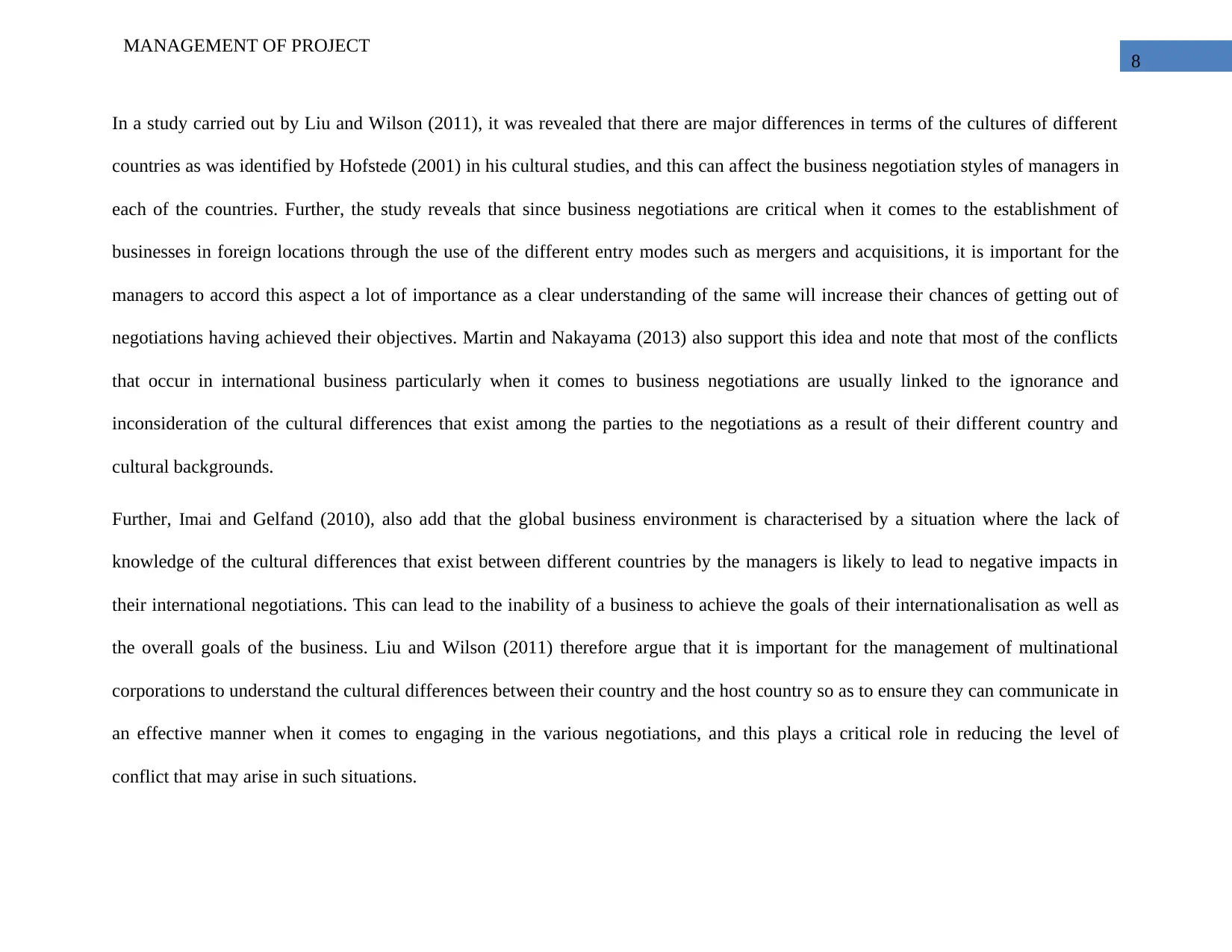
8
MANAGEMENT OF PROJECT
In a study carried out by Liu and Wilson (2011), it was revealed that there are major differences in terms of the cultures of different
countries as was identified by Hofstede (2001) in his cultural studies, and this can affect the business negotiation styles of managers in
each of the countries. Further, the study reveals that since business negotiations are critical when it comes to the establishment of
businesses in foreign locations through the use of the different entry modes such as mergers and acquisitions, it is important for the
managers to accord this aspect a lot of importance as a clear understanding of the same will increase their chances of getting out of
negotiations having achieved their objectives. Martin and Nakayama (2013) also support this idea and note that most of the conflicts
that occur in international business particularly when it comes to business negotiations are usually linked to the ignorance and
inconsideration of the cultural differences that exist among the parties to the negotiations as a result of their different country and
cultural backgrounds.
Further, Imai and Gelfand (2010), also add that the global business environment is characterised by a situation where the lack of
knowledge of the cultural differences that exist between different countries by the managers is likely to lead to negative impacts in
their international negotiations. This can lead to the inability of a business to achieve the goals of their internationalisation as well as
the overall goals of the business. Liu and Wilson (2011) therefore argue that it is important for the management of multinational
corporations to understand the cultural differences between their country and the host country so as to ensure they can communicate in
an effective manner when it comes to engaging in the various negotiations, and this plays a critical role in reducing the level of
conflict that may arise in such situations.
MANAGEMENT OF PROJECT
In a study carried out by Liu and Wilson (2011), it was revealed that there are major differences in terms of the cultures of different
countries as was identified by Hofstede (2001) in his cultural studies, and this can affect the business negotiation styles of managers in
each of the countries. Further, the study reveals that since business negotiations are critical when it comes to the establishment of
businesses in foreign locations through the use of the different entry modes such as mergers and acquisitions, it is important for the
managers to accord this aspect a lot of importance as a clear understanding of the same will increase their chances of getting out of
negotiations having achieved their objectives. Martin and Nakayama (2013) also support this idea and note that most of the conflicts
that occur in international business particularly when it comes to business negotiations are usually linked to the ignorance and
inconsideration of the cultural differences that exist among the parties to the negotiations as a result of their different country and
cultural backgrounds.
Further, Imai and Gelfand (2010), also add that the global business environment is characterised by a situation where the lack of
knowledge of the cultural differences that exist between different countries by the managers is likely to lead to negative impacts in
their international negotiations. This can lead to the inability of a business to achieve the goals of their internationalisation as well as
the overall goals of the business. Liu and Wilson (2011) therefore argue that it is important for the management of multinational
corporations to understand the cultural differences between their country and the host country so as to ensure they can communicate in
an effective manner when it comes to engaging in the various negotiations, and this plays a critical role in reducing the level of
conflict that may arise in such situations.
⊘ This is a preview!⊘
Do you want full access?
Subscribe today to unlock all pages.

Trusted by 1+ million students worldwide
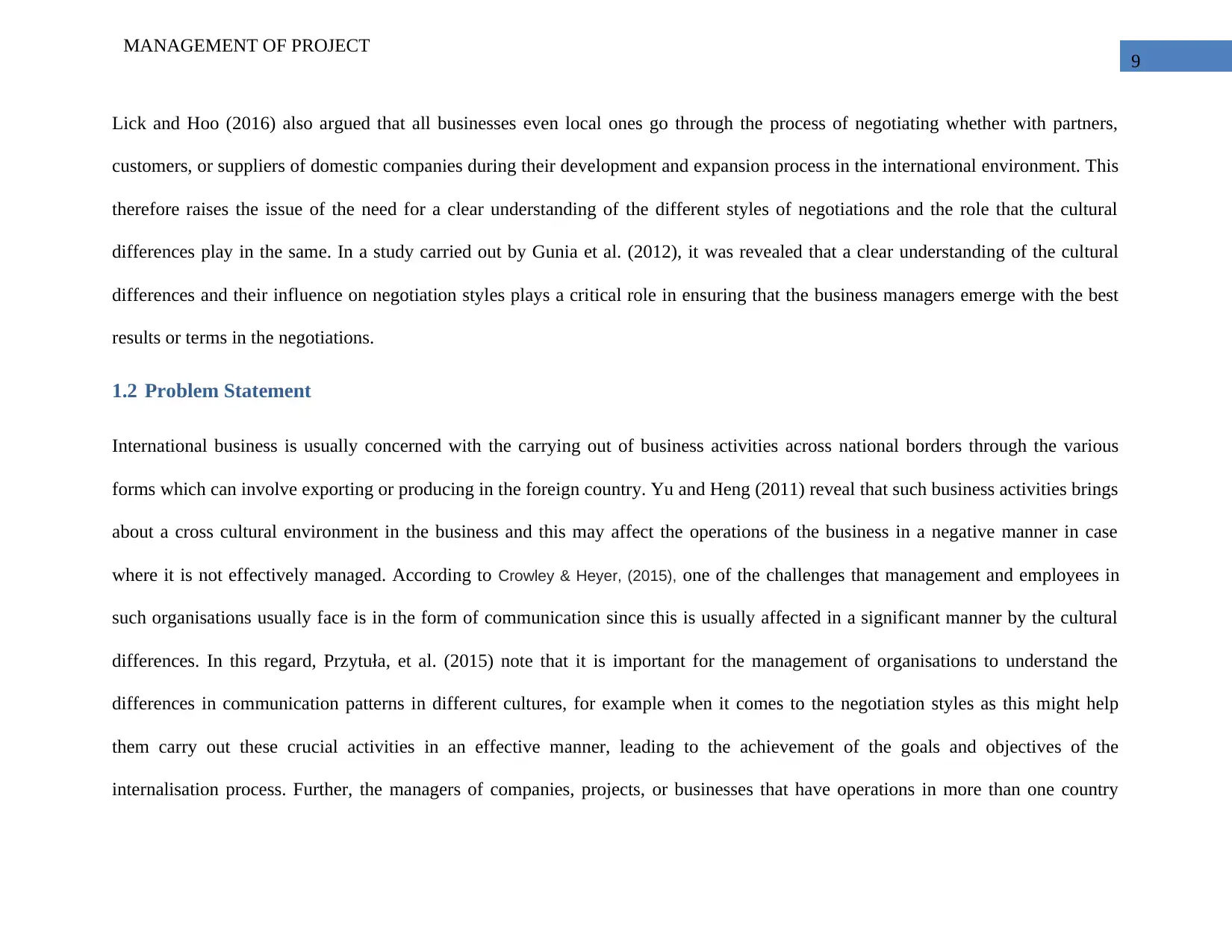
9
MANAGEMENT OF PROJECT
Lick and Hoo (2016) also argued that all businesses even local ones go through the process of negotiating whether with partners,
customers, or suppliers of domestic companies during their development and expansion process in the international environment. This
therefore raises the issue of the need for a clear understanding of the different styles of negotiations and the role that the cultural
differences play in the same. In a study carried out by Gunia et al. (2012), it was revealed that a clear understanding of the cultural
differences and their influence on negotiation styles plays a critical role in ensuring that the business managers emerge with the best
results or terms in the negotiations.
1.2 Problem Statement
International business is usually concerned with the carrying out of business activities across national borders through the various
forms which can involve exporting or producing in the foreign country. Yu and Heng (2011) reveal that such business activities brings
about a cross cultural environment in the business and this may affect the operations of the business in a negative manner in case
where it is not effectively managed. According to Crowley & Heyer, (2015), one of the challenges that management and employees in
such organisations usually face is in the form of communication since this is usually affected in a significant manner by the cultural
differences. In this regard, Przytuła, et al. (2015) note that it is important for the management of organisations to understand the
differences in communication patterns in different cultures, for example when it comes to the negotiation styles as this might help
them carry out these crucial activities in an effective manner, leading to the achievement of the goals and objectives of the
internalisation process. Further, the managers of companies, projects, or businesses that have operations in more than one country
MANAGEMENT OF PROJECT
Lick and Hoo (2016) also argued that all businesses even local ones go through the process of negotiating whether with partners,
customers, or suppliers of domestic companies during their development and expansion process in the international environment. This
therefore raises the issue of the need for a clear understanding of the different styles of negotiations and the role that the cultural
differences play in the same. In a study carried out by Gunia et al. (2012), it was revealed that a clear understanding of the cultural
differences and their influence on negotiation styles plays a critical role in ensuring that the business managers emerge with the best
results or terms in the negotiations.
1.2 Problem Statement
International business is usually concerned with the carrying out of business activities across national borders through the various
forms which can involve exporting or producing in the foreign country. Yu and Heng (2011) reveal that such business activities brings
about a cross cultural environment in the business and this may affect the operations of the business in a negative manner in case
where it is not effectively managed. According to Crowley & Heyer, (2015), one of the challenges that management and employees in
such organisations usually face is in the form of communication since this is usually affected in a significant manner by the cultural
differences. In this regard, Przytuła, et al. (2015) note that it is important for the management of organisations to understand the
differences in communication patterns in different cultures, for example when it comes to the negotiation styles as this might help
them carry out these crucial activities in an effective manner, leading to the achievement of the goals and objectives of the
internalisation process. Further, the managers of companies, projects, or businesses that have operations in more than one country
Paraphrase This Document
Need a fresh take? Get an instant paraphrase of this document with our AI Paraphraser
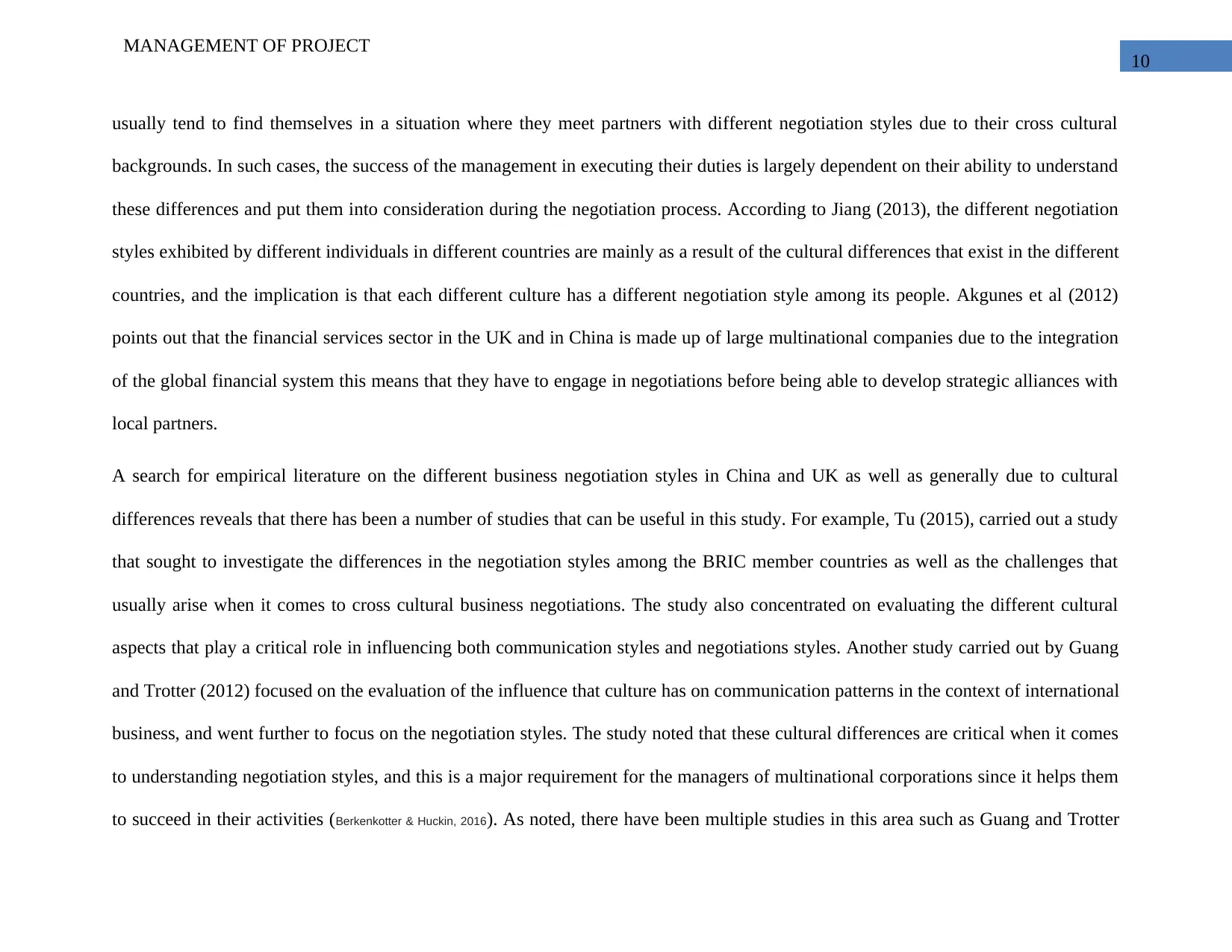
10
MANAGEMENT OF PROJECT
usually tend to find themselves in a situation where they meet partners with different negotiation styles due to their cross cultural
backgrounds. In such cases, the success of the management in executing their duties is largely dependent on their ability to understand
these differences and put them into consideration during the negotiation process. According to Jiang (2013), the different negotiation
styles exhibited by different individuals in different countries are mainly as a result of the cultural differences that exist in the different
countries, and the implication is that each different culture has a different negotiation style among its people. Akgunes et al (2012)
points out that the financial services sector in the UK and in China is made up of large multinational companies due to the integration
of the global financial system this means that they have to engage in negotiations before being able to develop strategic alliances with
local partners.
A search for empirical literature on the different business negotiation styles in China and UK as well as generally due to cultural
differences reveals that there has been a number of studies that can be useful in this study. For example, Tu (2015), carried out a study
that sought to investigate the differences in the negotiation styles among the BRIC member countries as well as the challenges that
usually arise when it comes to cross cultural business negotiations. The study also concentrated on evaluating the different cultural
aspects that play a critical role in influencing both communication styles and negotiations styles. Another study carried out by Guang
and Trotter (2012) focused on the evaluation of the influence that culture has on communication patterns in the context of international
business, and went further to focus on the negotiation styles. The study noted that these cultural differences are critical when it comes
to understanding negotiation styles, and this is a major requirement for the managers of multinational corporations since it helps them
to succeed in their activities (Berkenkotter & Huckin, 2016). As noted, there have been multiple studies in this area such as Guang and Trotter
MANAGEMENT OF PROJECT
usually tend to find themselves in a situation where they meet partners with different negotiation styles due to their cross cultural
backgrounds. In such cases, the success of the management in executing their duties is largely dependent on their ability to understand
these differences and put them into consideration during the negotiation process. According to Jiang (2013), the different negotiation
styles exhibited by different individuals in different countries are mainly as a result of the cultural differences that exist in the different
countries, and the implication is that each different culture has a different negotiation style among its people. Akgunes et al (2012)
points out that the financial services sector in the UK and in China is made up of large multinational companies due to the integration
of the global financial system this means that they have to engage in negotiations before being able to develop strategic alliances with
local partners.
A search for empirical literature on the different business negotiation styles in China and UK as well as generally due to cultural
differences reveals that there has been a number of studies that can be useful in this study. For example, Tu (2015), carried out a study
that sought to investigate the differences in the negotiation styles among the BRIC member countries as well as the challenges that
usually arise when it comes to cross cultural business negotiations. The study also concentrated on evaluating the different cultural
aspects that play a critical role in influencing both communication styles and negotiations styles. Another study carried out by Guang
and Trotter (2012) focused on the evaluation of the influence that culture has on communication patterns in the context of international
business, and went further to focus on the negotiation styles. The study noted that these cultural differences are critical when it comes
to understanding negotiation styles, and this is a major requirement for the managers of multinational corporations since it helps them
to succeed in their activities (Berkenkotter & Huckin, 2016). As noted, there have been multiple studies in this area such as Guang and Trotter
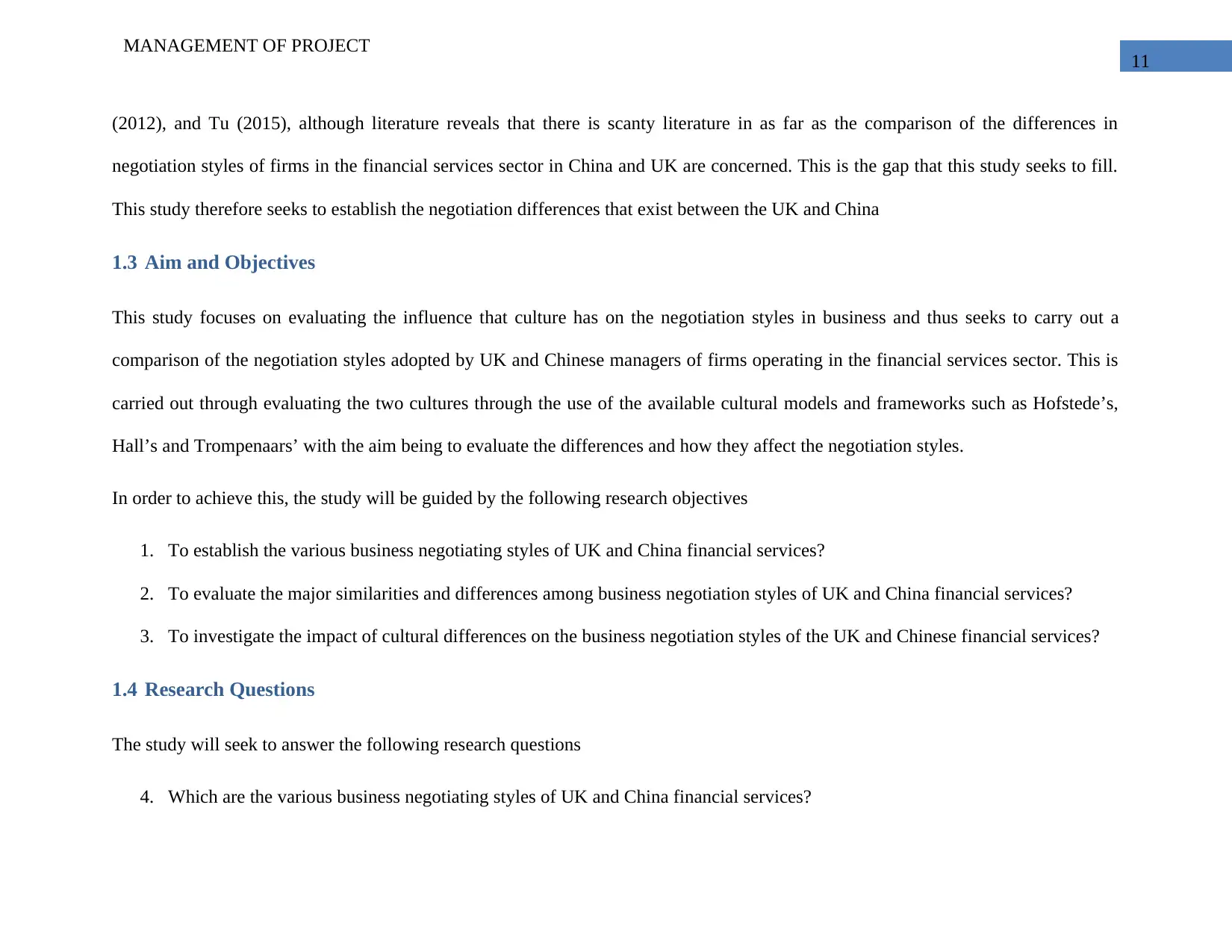
11
MANAGEMENT OF PROJECT
(2012), and Tu (2015), although literature reveals that there is scanty literature in as far as the comparison of the differences in
negotiation styles of firms in the financial services sector in China and UK are concerned. This is the gap that this study seeks to fill.
This study therefore seeks to establish the negotiation differences that exist between the UK and China
1.3 Aim and Objectives
This study focuses on evaluating the influence that culture has on the negotiation styles in business and thus seeks to carry out a
comparison of the negotiation styles adopted by UK and Chinese managers of firms operating in the financial services sector. This is
carried out through evaluating the two cultures through the use of the available cultural models and frameworks such as Hofstede’s,
Hall’s and Trompenaars’ with the aim being to evaluate the differences and how they affect the negotiation styles.
In order to achieve this, the study will be guided by the following research objectives
1. To establish the various business negotiating styles of UK and China financial services?
2. To evaluate the major similarities and differences among business negotiation styles of UK and China financial services?
3. To investigate the impact of cultural differences on the business negotiation styles of the UK and Chinese financial services?
1.4 Research Questions
The study will seek to answer the following research questions
4. Which are the various business negotiating styles of UK and China financial services?
MANAGEMENT OF PROJECT
(2012), and Tu (2015), although literature reveals that there is scanty literature in as far as the comparison of the differences in
negotiation styles of firms in the financial services sector in China and UK are concerned. This is the gap that this study seeks to fill.
This study therefore seeks to establish the negotiation differences that exist between the UK and China
1.3 Aim and Objectives
This study focuses on evaluating the influence that culture has on the negotiation styles in business and thus seeks to carry out a
comparison of the negotiation styles adopted by UK and Chinese managers of firms operating in the financial services sector. This is
carried out through evaluating the two cultures through the use of the available cultural models and frameworks such as Hofstede’s,
Hall’s and Trompenaars’ with the aim being to evaluate the differences and how they affect the negotiation styles.
In order to achieve this, the study will be guided by the following research objectives
1. To establish the various business negotiating styles of UK and China financial services?
2. To evaluate the major similarities and differences among business negotiation styles of UK and China financial services?
3. To investigate the impact of cultural differences on the business negotiation styles of the UK and Chinese financial services?
1.4 Research Questions
The study will seek to answer the following research questions
4. Which are the various business negotiating styles of UK and China financial services?
⊘ This is a preview!⊘
Do you want full access?
Subscribe today to unlock all pages.

Trusted by 1+ million students worldwide
1 out of 84
Related Documents
Your All-in-One AI-Powered Toolkit for Academic Success.
+13062052269
info@desklib.com
Available 24*7 on WhatsApp / Email
![[object Object]](/_next/static/media/star-bottom.7253800d.svg)
Unlock your academic potential
Copyright © 2020–2026 A2Z Services. All Rights Reserved. Developed and managed by ZUCOL.





